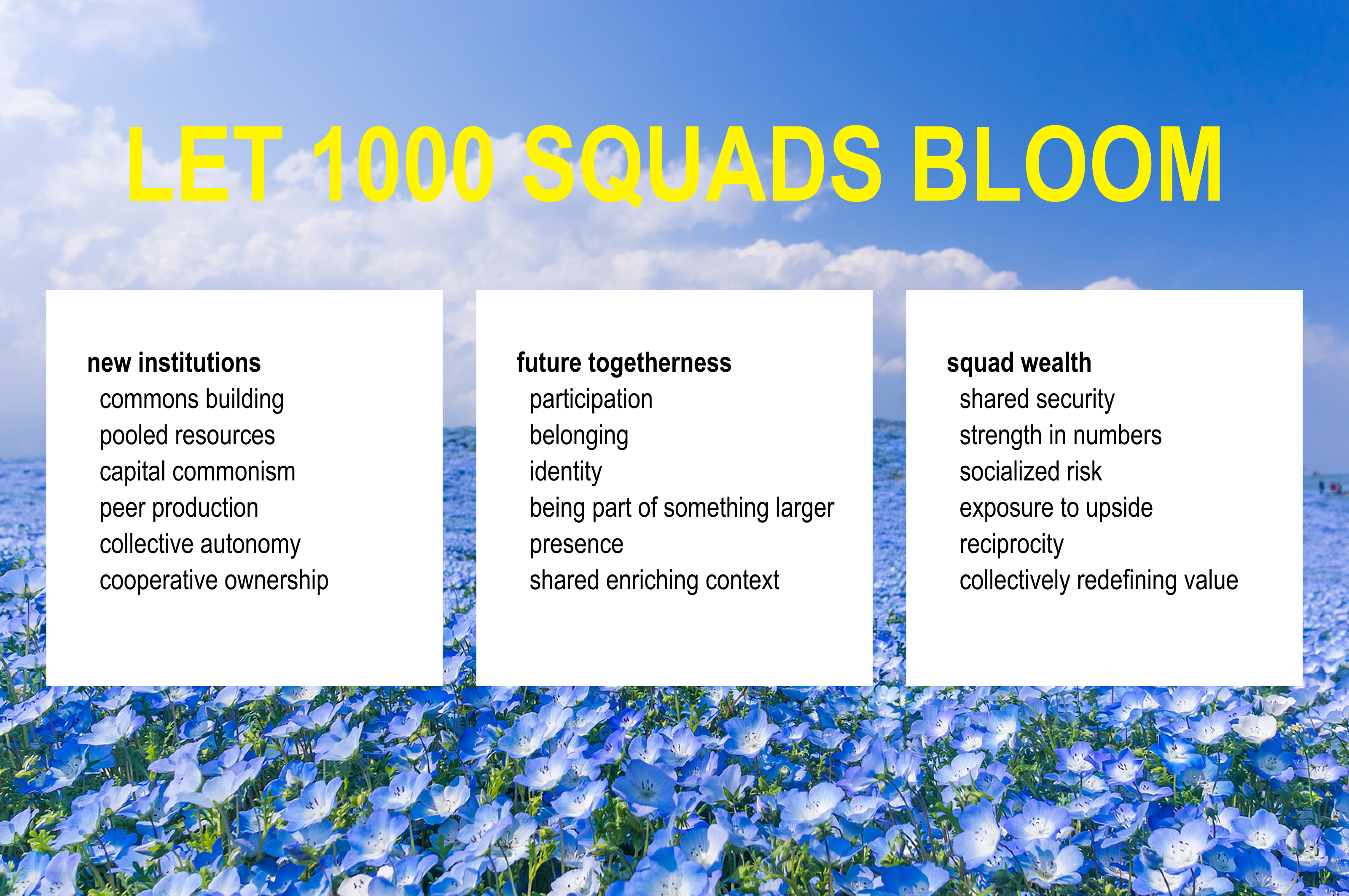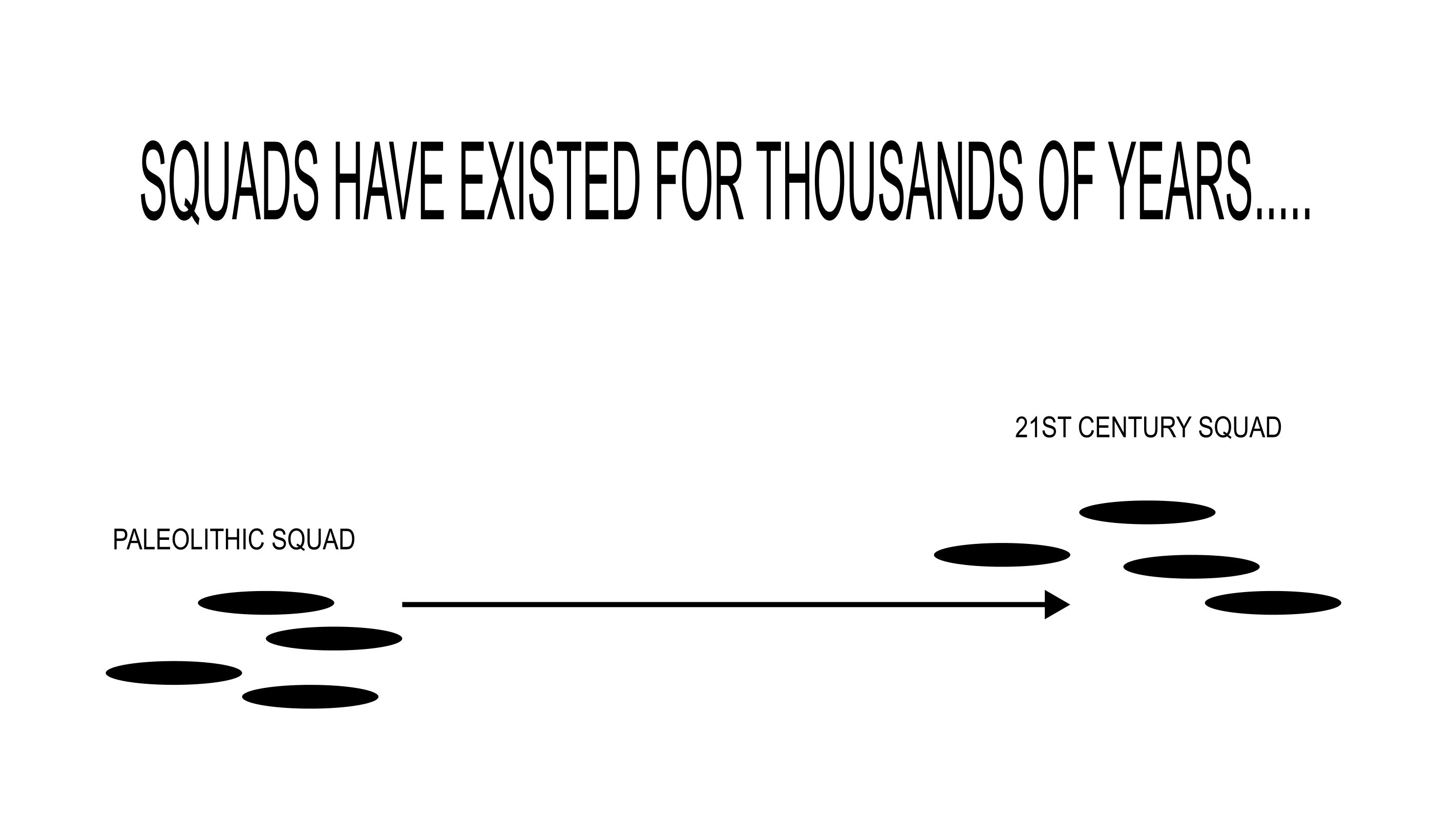
Recent events have completely exposed the limits of individual agency, creating a powerful demand for squad-based forms of resiliency. The COVID-19 pandemic is the most recent of these social bonding agents: though we're physically distancing, emotionally we're getting closer. First priority when the virus dropped was securing your squad. The need for group coordination and decision-making soon followed.
But today's emerging culture of group cohesion is driven equally by the social and financial precarity of urban life. Family are those we share space and rent with. Priced out of tier-1 cities, individuals have banded together to survive a jobless market with no social safety net.
Squads are both a product of—and a response to—contemporary social atomization. The trope of "getting a place upstate" signifies young city-dwellers' desire for new kinds of squad-based homesteading. HOMESQUADING is a modern day back-to-the-land movement—swap Whole Earth-inspired post-war communes with post-internet surf clubs microblogging the virtues of cooperative housing, permaculture gardening, and solar-powered mesh networks.
Squad culture is the antithesis of neoliberal individualism. Millennials are healing from decades of irony poisoning, rediscovering what it's like to have generative, exploratory relationships with one another. Younger generations are already imbued with extremely powerful squad energy, equipped with formative experiences in Minecraft, DOTA 2, and Fortnite parties.
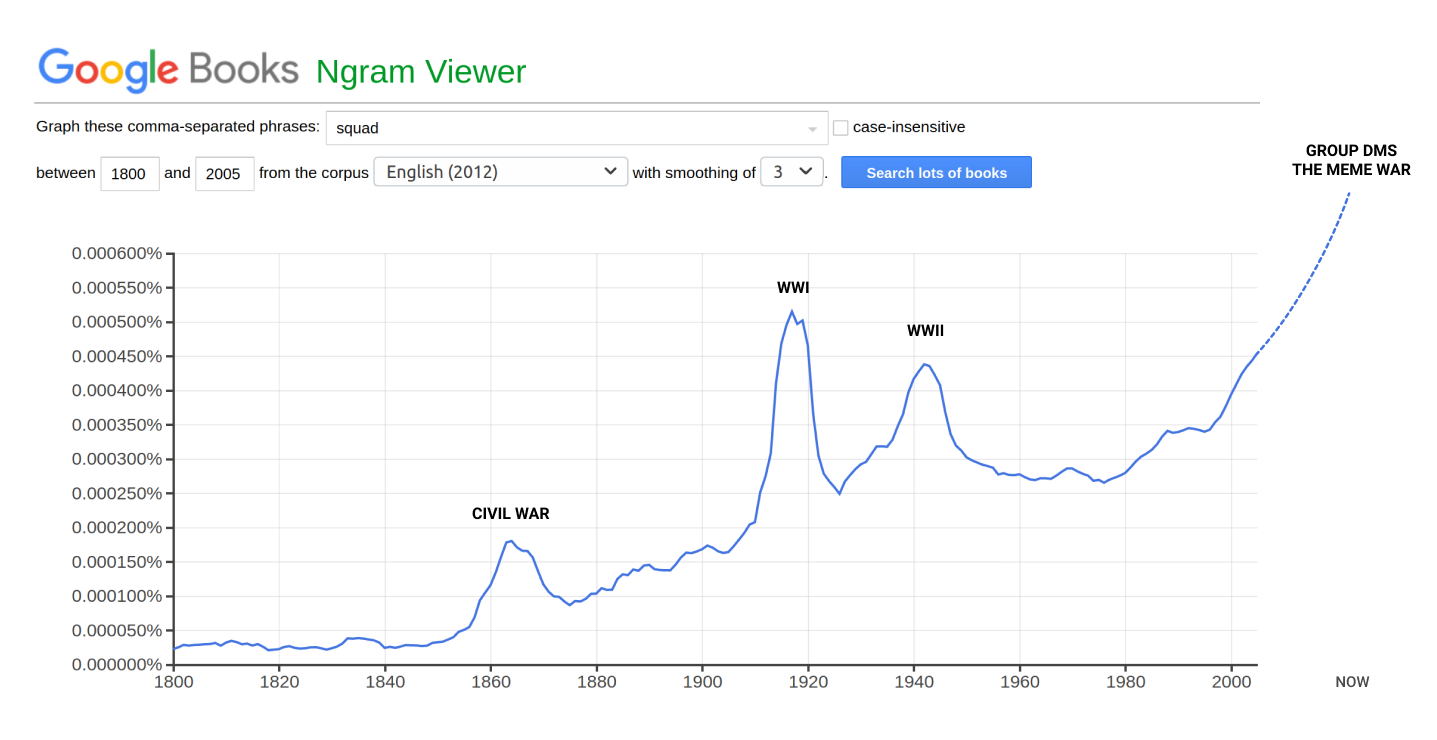
Whether bound together for survival or for lols, the squads formed by today's crisis will be resilient. Distance is no longer a barrier with the closeness of network space—soon vital culture will be predominantly enacted by fictive kin. Group collaboration is now the strong default, putting squads at the center of social, cultural, and economic life. To paraphrase K-HOLE: today people are born as individuals, and have to find their squad.
THEORY OF THE SQUAD
While ancient squads were brought together by the struggle for survival, always-on group communication sets the scene for contemporary squad culture. Group chats and adapted team workspaces create shared context and institutional memory. One necessary condition of the squad is this sense of persistence: co-presence and continuous availability to one another.
But the squad is more than a loose network of affiliations, it's a coherent body. A second prerequisite of squad formation is self-recognition. It's not you or me. It's Us. We. Ours. This pillar often follows from the first. Squads may start as one-off Telegram channels, but they soon become "The Group Chat," a metonym for the squad itself.
For the squad to understand itself as a whole, it maintains boundaries circumscribing strong group norms. Fuck a Dunbar number—the ideal squad count is no more than 12. How can you really be present with more than a dozen people? Small groups are crucial for tight coordination. A greater network may surround the squad, making it appear big and fuzzy from the outside. But for the core crew, an invisible circle binds and protects a space of group identity.
As SQUAD VIBES grow, so does the possibility of interdependence and resource sharing—social, emotional, financial. Trust brought by consistent socialization and self-recognition is a foundation for exploring what the squad is capable of together. SQUAD CULTURE has only just begun.
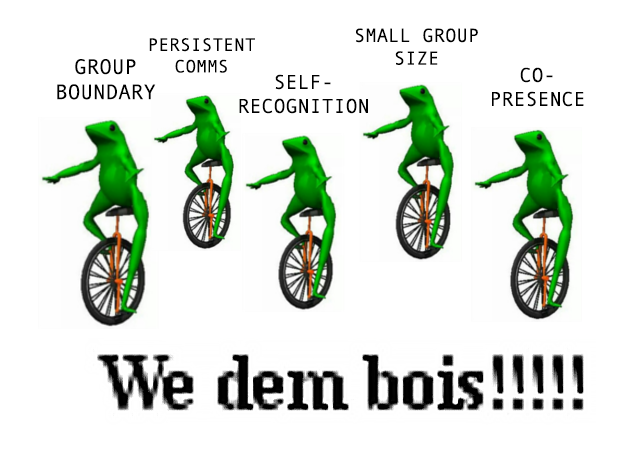
SQUAD SPACE
The pandemic flipped the script on sharing space IRL, but our newly domestic reality only brought to the physical world what was already extremely online. Originally conceived as series of linked documents, Web 2.0 mass productization turned the internet into a series of linked interiors.
Today's squads are expressions of digital locality and the new squad era forces us to reconsider the individuated logic of early social networks. Contrary to early visions of hypertext, the internet is not a singular World Wide Web, traversed by individuals. To be online today is to enter the global arena. Mass social media are hazardous PvP zones no one should traverse without team support.
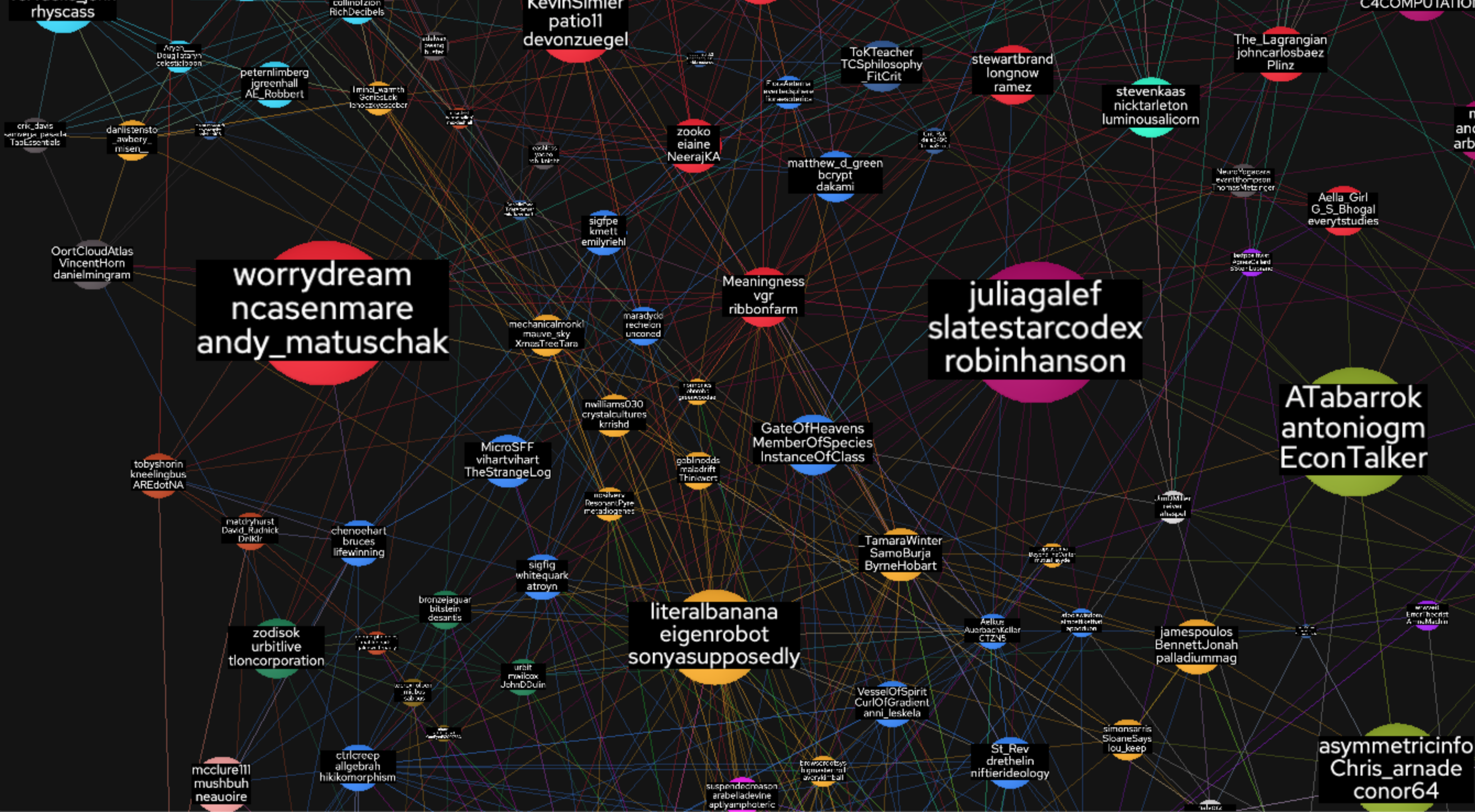
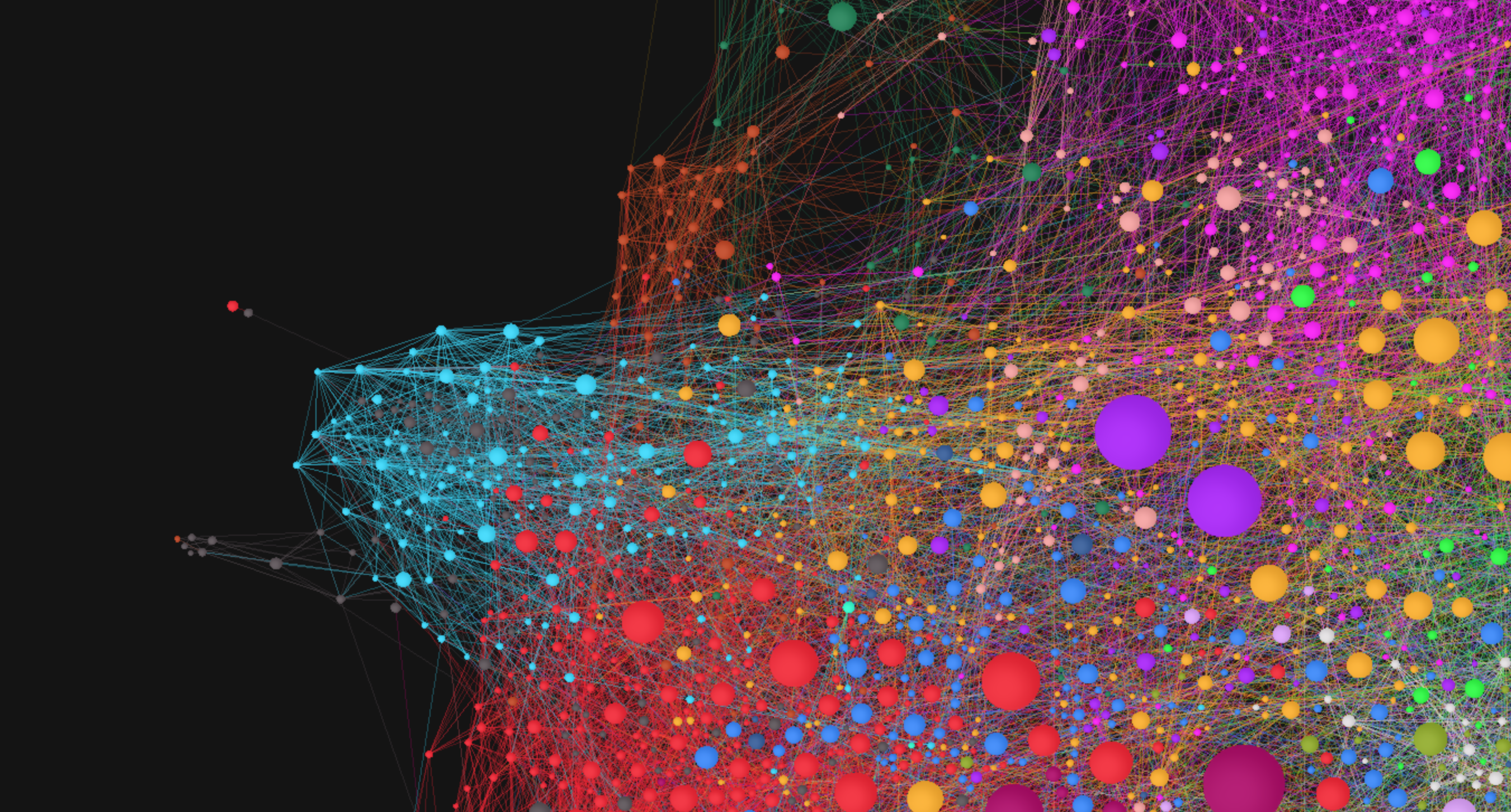
The Twitter subcultures shown above are only a sliver of an expansive social deep web. Beneath this fuzzy graph is SQUAD SPACE, the network of inner-zones where digital microcultures are born: group DMs, Discords, Slacks, Keybases. Memes forged in SQUAD SPACE bubble out into the "clearnet" above, pwning NPCs on the internet of beefs.

Squad culture is downstream of squad space, and the digital places squads inhabit are only getting more advanced. The Discord can suddenly be on calls together. The Keybase can now use Git. The team toolkit defines its capabilities, and different platforms enable different modes of squad thought. Squad space is more than environment, it's a collective body, a shared cognition layer. Squad space is where market-moving trades are planned, conspiracies are conceived, and memes are spawned. Members of the squad may live in different geographies—but within this space, everyone is on SQUAD TIME. The founding of a new group DM is year zero.
Group dynamics ebb and flow with their environment, and nowhere more than SQUAD SPACE. Ecology calls this process “niche formation.” Online it's SQUAD CULTURE.
SQUAD VIBES
Inside the subterranean caves of the social deep web, chosen-kin groups grow their own culture. The squad doesn't need its own micro-currency—images, art, music, takes, shitposts, and, indeed, roasts are the native medium of exchange. Likewise squads have little use for internal financial incentives. Instead, playful exchanges produce trust, reciprocity, and VIBES—the ineffable group energy that squads value most. Accordingly, the core of squad production is the continuous production of the squad itself.
Evidenced by the power of crypto memetics, ragtag squads of shitposters have the power to define new forms of value based on their own esoteric social frameworks. Memeing produces "assets" that cannot be traditionally valued, but are capable of commanding cultural and economic movements.
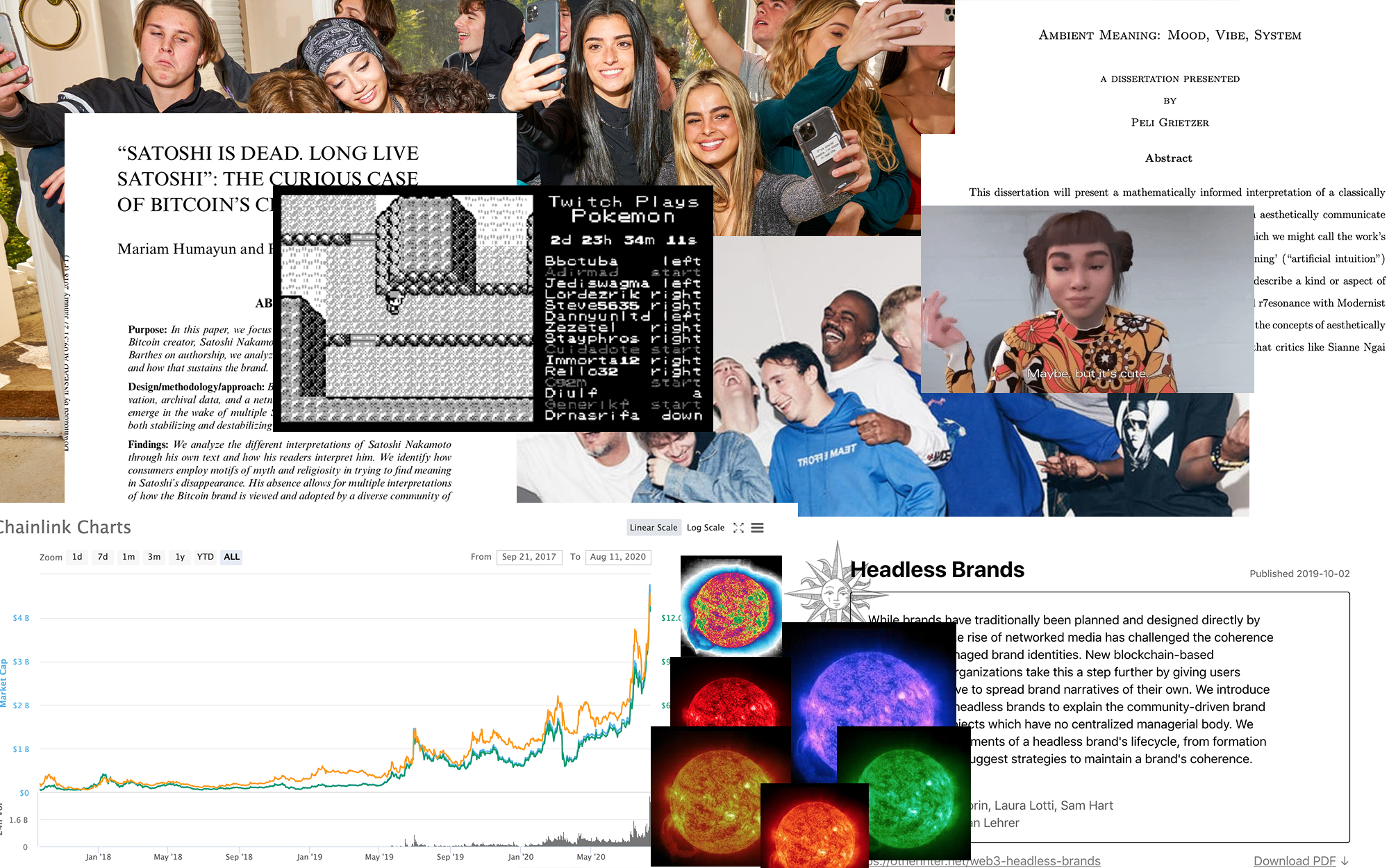
Memes, hot takes, internal language, 𝓪𝓮𝓼𝓽𝓱𝓮𝓽𝓲𝓬𝓼... artifacts that can only be formulated as a group are the mainstay of squad production. The group exudes potent SQUAD VIBES, and vibes attract. Outsiders want to share the vibe—sometimes for the social capital, sometimes because the content produced is of strategic value, and always because the energy is infectious. After enough fire in the group DM, some squads begin to externalize their social products. Podcasting is obviously a squad technology. Rapid publishing turns memes into whitepapers, quickly flooding the marketplace of ideas with locally-grown squad humor.
Whether formed by necessity or chance, once together the squad's potential for creative production is immeasurable. VIBE is an unstable substance of high information density. In formalizing their vibes, squads may accidentally give birth to headless brands, virtual personalities, and pseudonymous entities they may not even be able to control. Thus the squad transitions from its youthful, entropic state, harnessing its vibes to create a source of unfathomable squad energy.
SQUAD PRODUCTION
Group identity. Shared space. Vibes. These not only enable the creation of social capital, but strengthen the squad's capacity to organize, minimizing transaction costs and leading to greater productive capacities and resilience; this is "the nature of the squad." But while squads can be viewed as a "nexus of contracts", unlike the Coasean firm, they are without legal structure. Social contracts are instead effected through the unspoken bonds of mutual respect and ingroup norms.
But to sustain this solidarity economy the squad may look for ways to translate vibes into monetizable modes of public engagement: clients, subscribers, sponsors, music deals, yields. SQUAD PRODUCTION begins with the creation of processes and interfaces to convert creative labor into units that can be transmitted by global network participants. Here SQUAD TOOLS come into play. Vibes generated at the DAW, on the Figma board, or in the gaming lobby are turned consumable cultural instruments. Then it's just a matter of distribution. Young artists create online galleries and independent labels because they allow groups to interact (and transact) with the world through familiar organizational patterns. Bandcamps, Twitch pages, DAOs are public APIs for squads to interact with entities beyond their trust boundary.
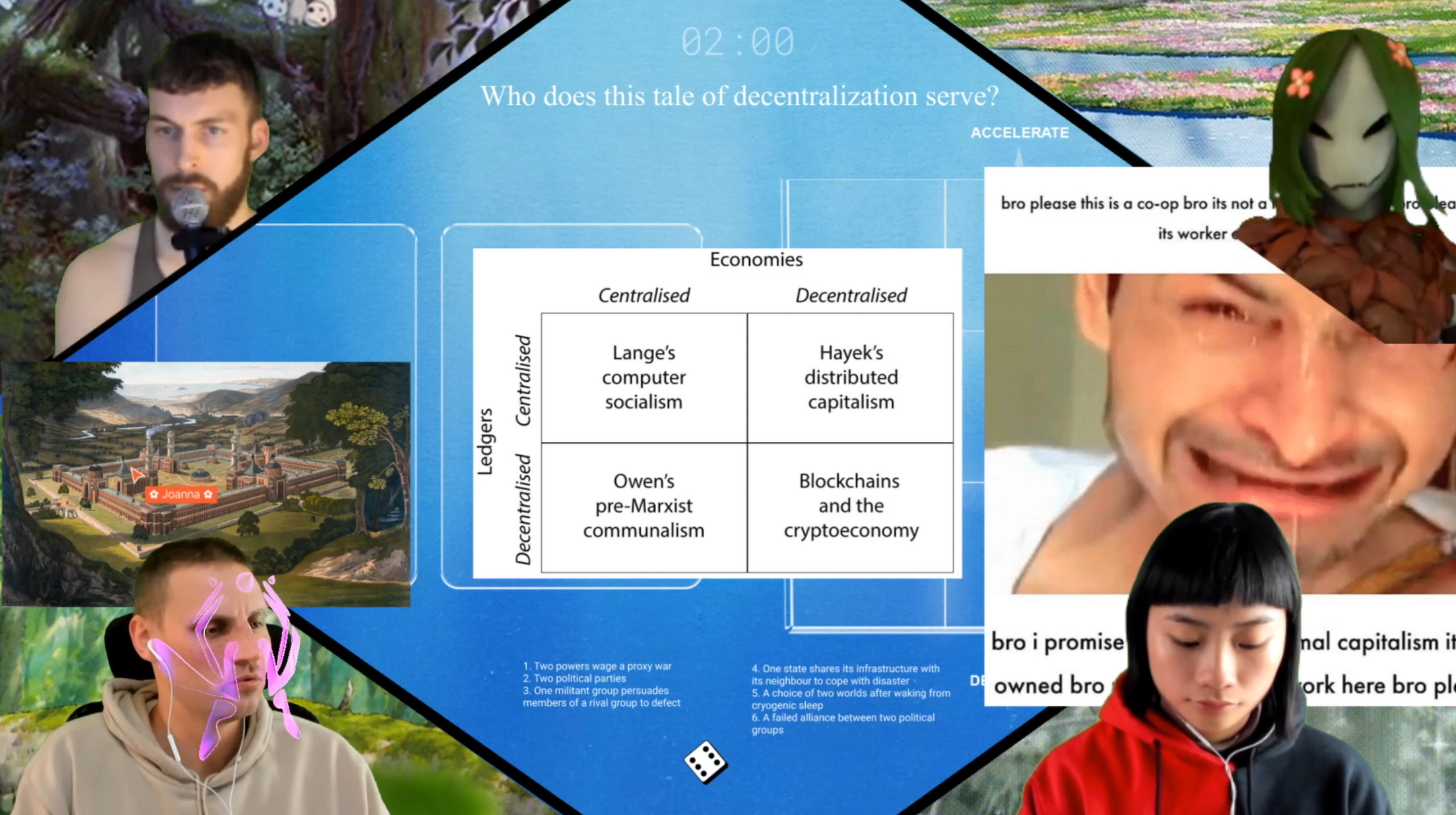
Some digital tools are public interfaces, while others are used to coordinate internally. Today this SQUAD INFRASTRUCTURE is comprised of simple software primitives: Venmo, Splitwise, Cash App. These apps are financial plumbing that facilitate internal coordination between squad members by minimizing the awkwardness of asking your friends for money. Despite the strong demand for SQUAD RESILIENCY, the social stigma of group finances is still a major barrier to economic exchange among friends.
In-app mechanics like budget trackers, polls, and coin-flips offer a half-way point between social agreements and technical solutions. For instance Splitwise relies heavily on the social norms to ensure expenses are entered accurately. By allowing individuals to opt-in to a set of rules for retroactive settlement the group's social friction and coordination costs are reduced. Civilization advances by extending the number of important functions squads can perform without thinking.
Some believe new software can liberate "individual creators." But this kind of thinking inevitably leads to Uberized platform-mediated wage labor. We want to liberate squads. The group is the basic user class for the tools we need today as a society, yet few pieces of software allow the squad as a whole to produce cooperatively and generate wealth together. To fully realize SQUAD CULTURE this must change.
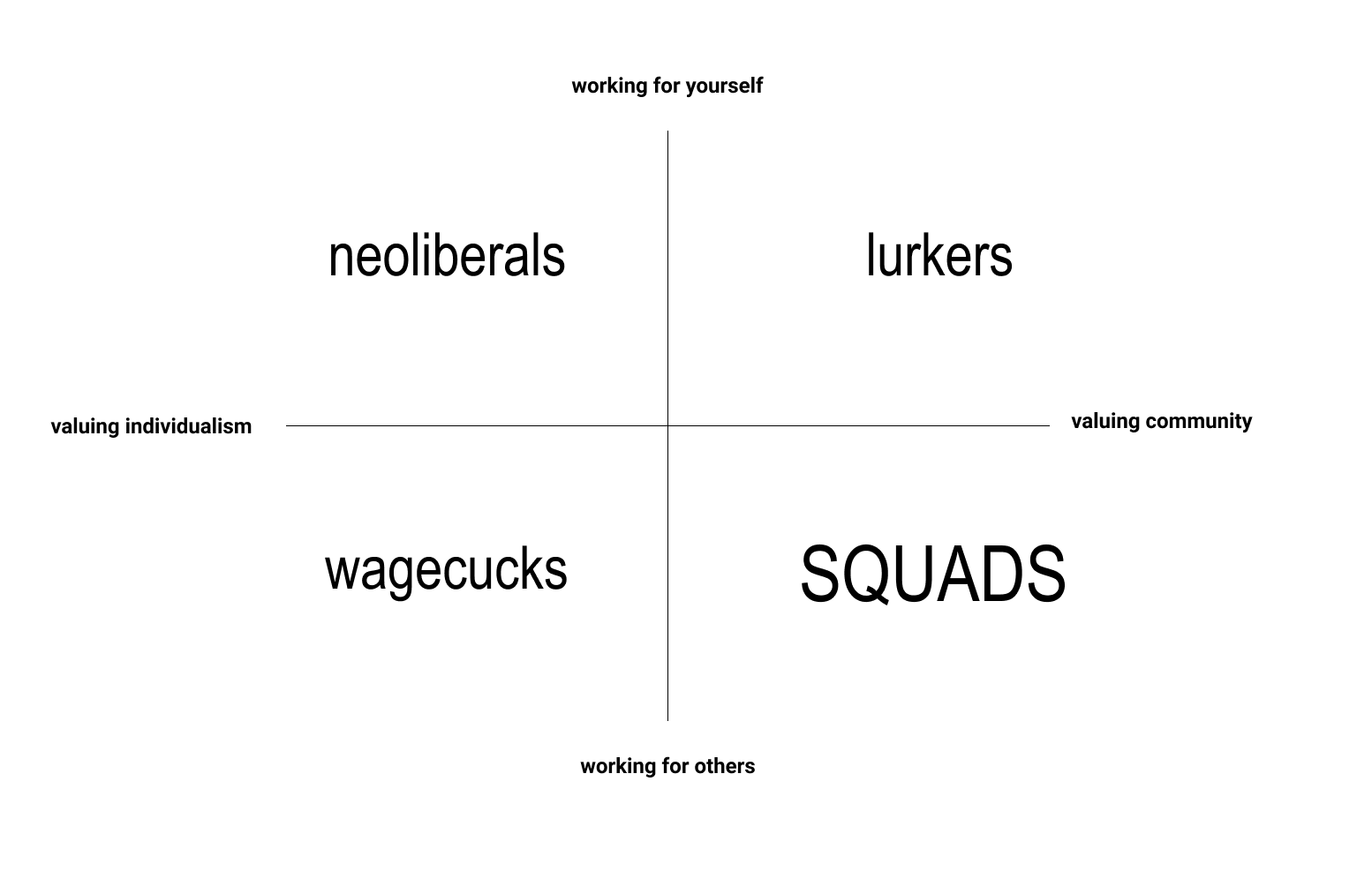
SQUAD WEALTH
With new plug-and-play financial tools, squads are becoming more economically and socially resilient. Individuals may have limited access to compounding returns, but groups have greater flexibility to move along the risk-reward curve.
Contributions to the squad are positive sum. And in return for their contribution, members have access to an expanded set of opportunities, claims on future economic flows and guarantees backed by the group. By risking together, a scrappy group can gain access to multiplicative yields—the path to SQUAD WEALTH.

A strong social fabric and the right tech stack will unleash a new wave of bottom-up economic experiments: interest-free P2P borrowing, anonymous lending pools, collective insurance, socialized ETFs, DAO-based freelancer unions, rotating savings schemes, revshare guilds, meme venture syndicates, crypto ponzis, exit scams, in-browser miners, upstate yield farms, boy bands, cults, and sovereign vacation funds.
The point is clear: access to finance and the creation of capital assets is crucial. What squads need now is the technical infrastructure to capture and compound jointly produced value.
Though dollars keep squads afloat, dialing up the financial infrastructure too soon can kill the vibe. The squad economy primarily yields non-monetary forms of value. SQUAD WEALTH is a rate of 5 memes per day, it's the e-girls vacation, the TikToker hype house, the empty church your crew rented upstate. SQUAD WEALTH is when the Discord is popping off and it brings you more joy than a 70-hour-week hustle ever could. Millennials all want to quit their jobs and start venture-funded companies, squads are already on some other shit.
Squads are woke to the empty neoliberal promises of gig-economy "employment" and para-social personal brands. Squads value self-determination, not through individualism, but through collective maintenance and care for one another. Squads value creative expression, but celebrate the group rather than individual authorship. For the squad, the autonomous is always collective.
But can squads scale? Squads are first and foremost cultures, not businesses. Financial maximization is not their primary objective—squads just want to keep the vibes going. Stable revenue is a worthy accomplishment in and of itself.
Instead, squads can extend themselves horizontally by inventing new aesthetics, organizational forms, and creative products that become the template for others. When squad vibes transmit they take on a life of their own. While the material value of these patterns may be limited, the significance of memeing a new bottom-up economic model into existence cannot be understated.
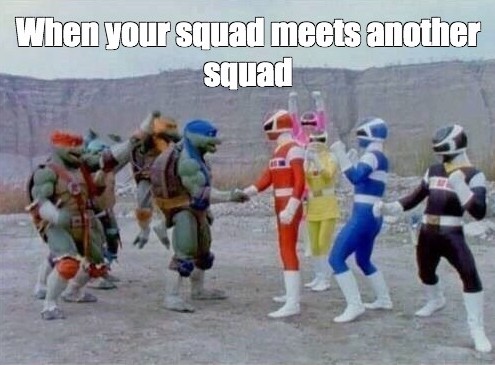
Squads will be as important as companies in the years to come. And as the micro-structure of our social and economic fabric changes, strong vibes and sustainability will become the new metric of success. Squads don't need to scale. They can just spread the big squad energy.
BIG SQUAD ENERGY
How big is BIG SQUAD ENERGY? Yes, squads are friends empowered by digital tools, but this is much more than new chat apps and online "community platforms." This is the movement. Squaddom is about new ways of being together, learning, and making meaning in an increasingly complex world. Squads are groups fueled by vibes, memes, and values, but they are not mindless swarms. Rather squads are proto-institutions that engage the world on their own terms.
Squads are a collective redefinition of value.
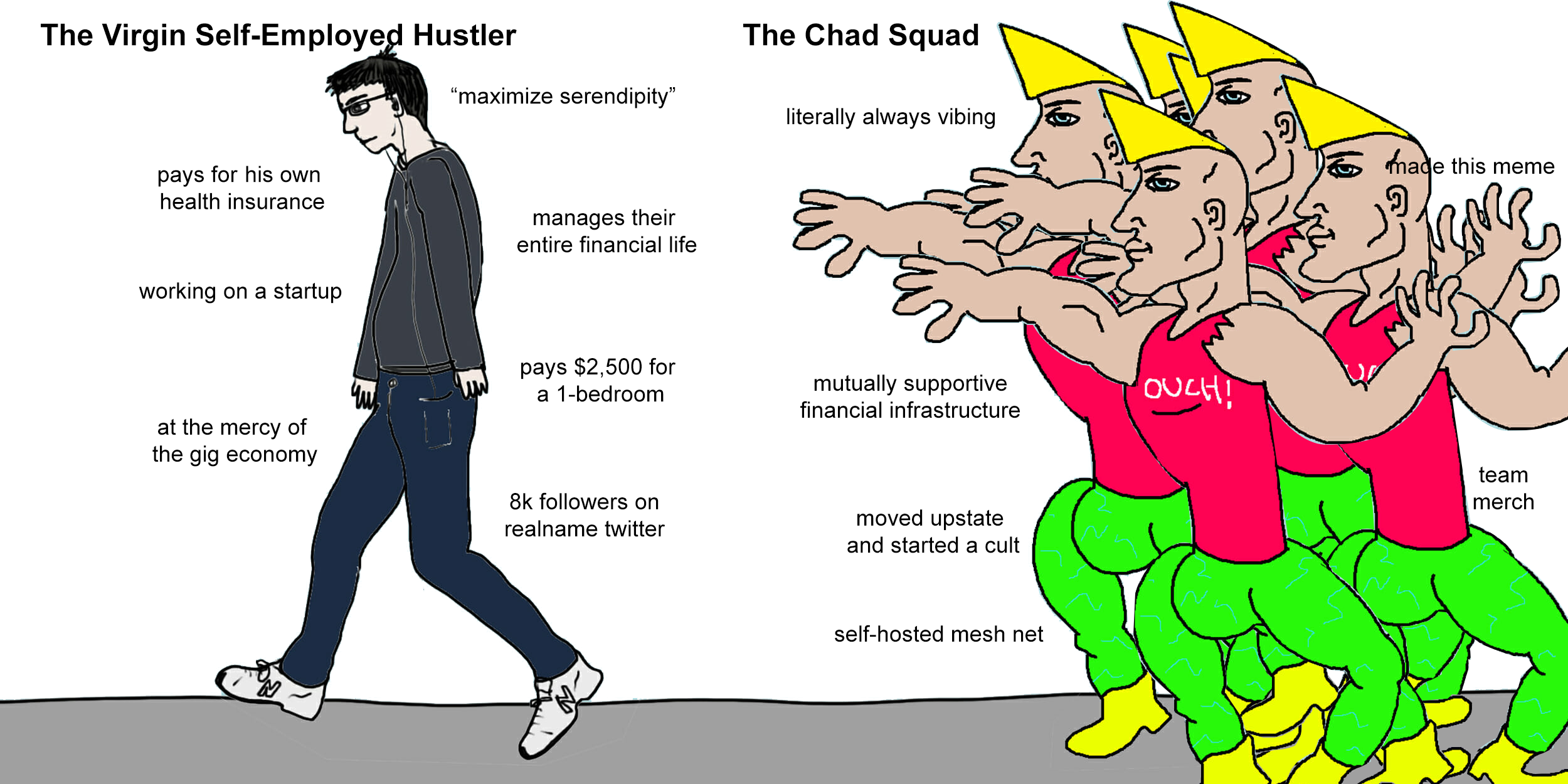
Squads are a shared context that is enriching.
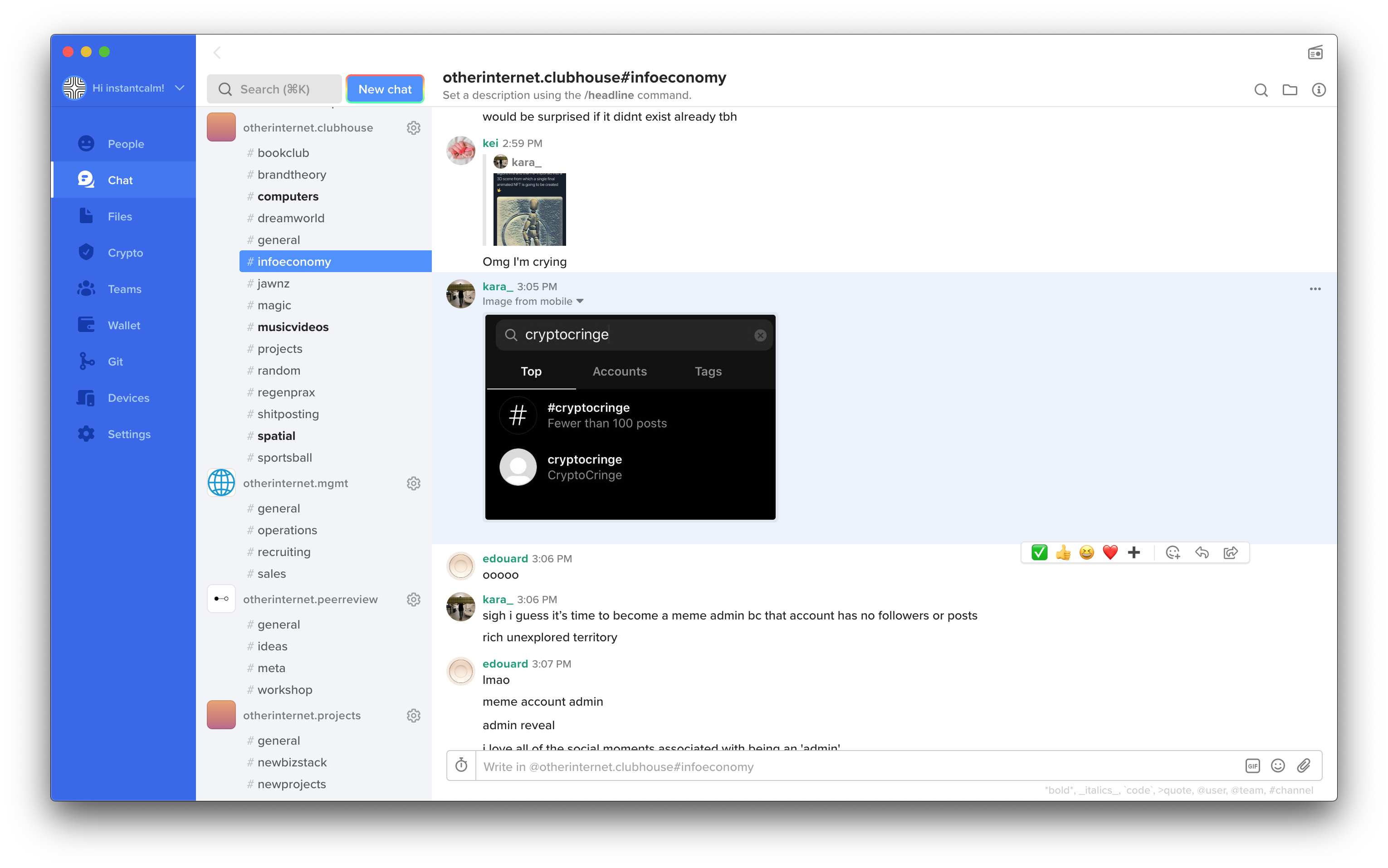
Squads are the unforeseen effect of digital networks...
Squads are the end of the end of history
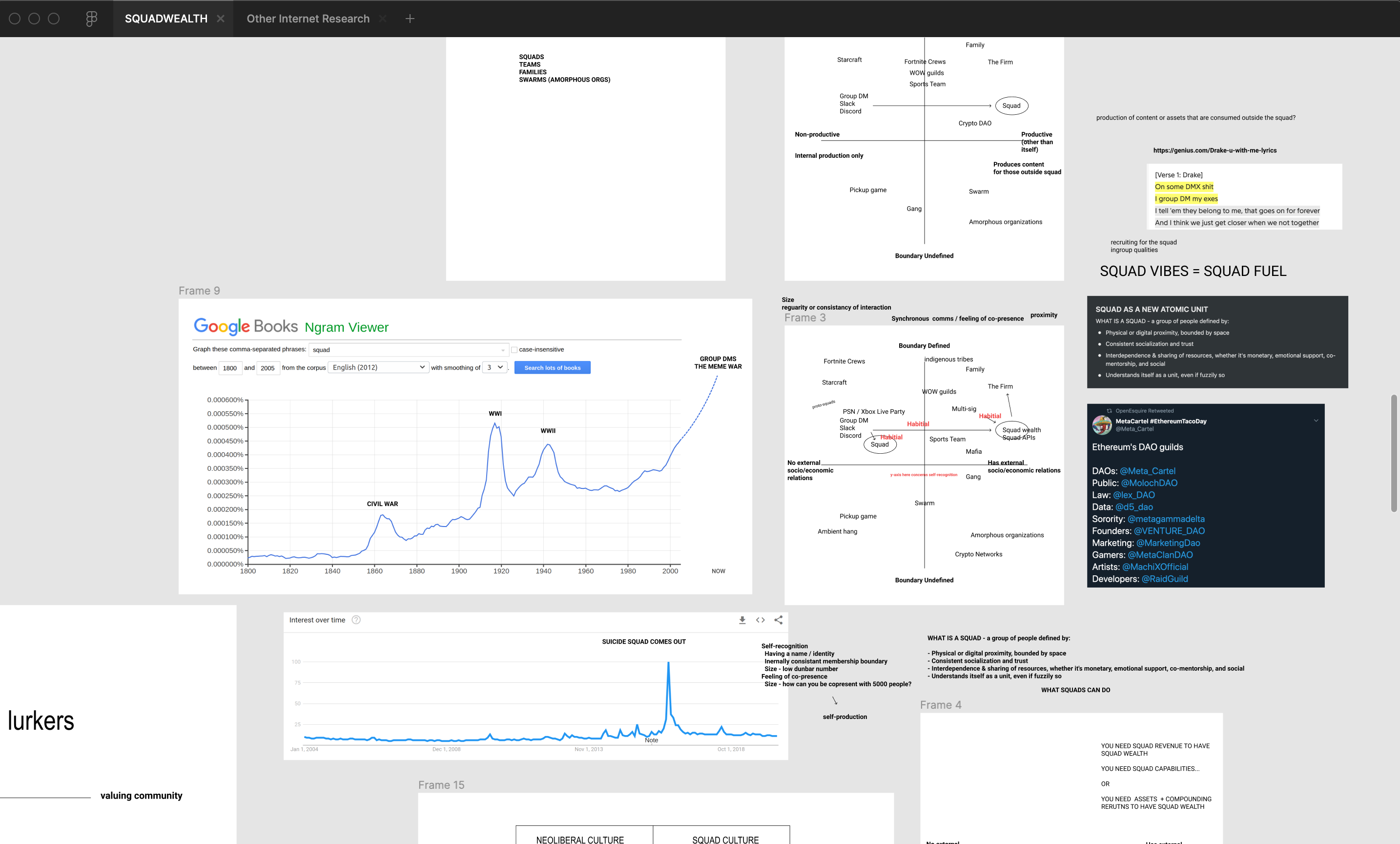
Squads are wholesome af
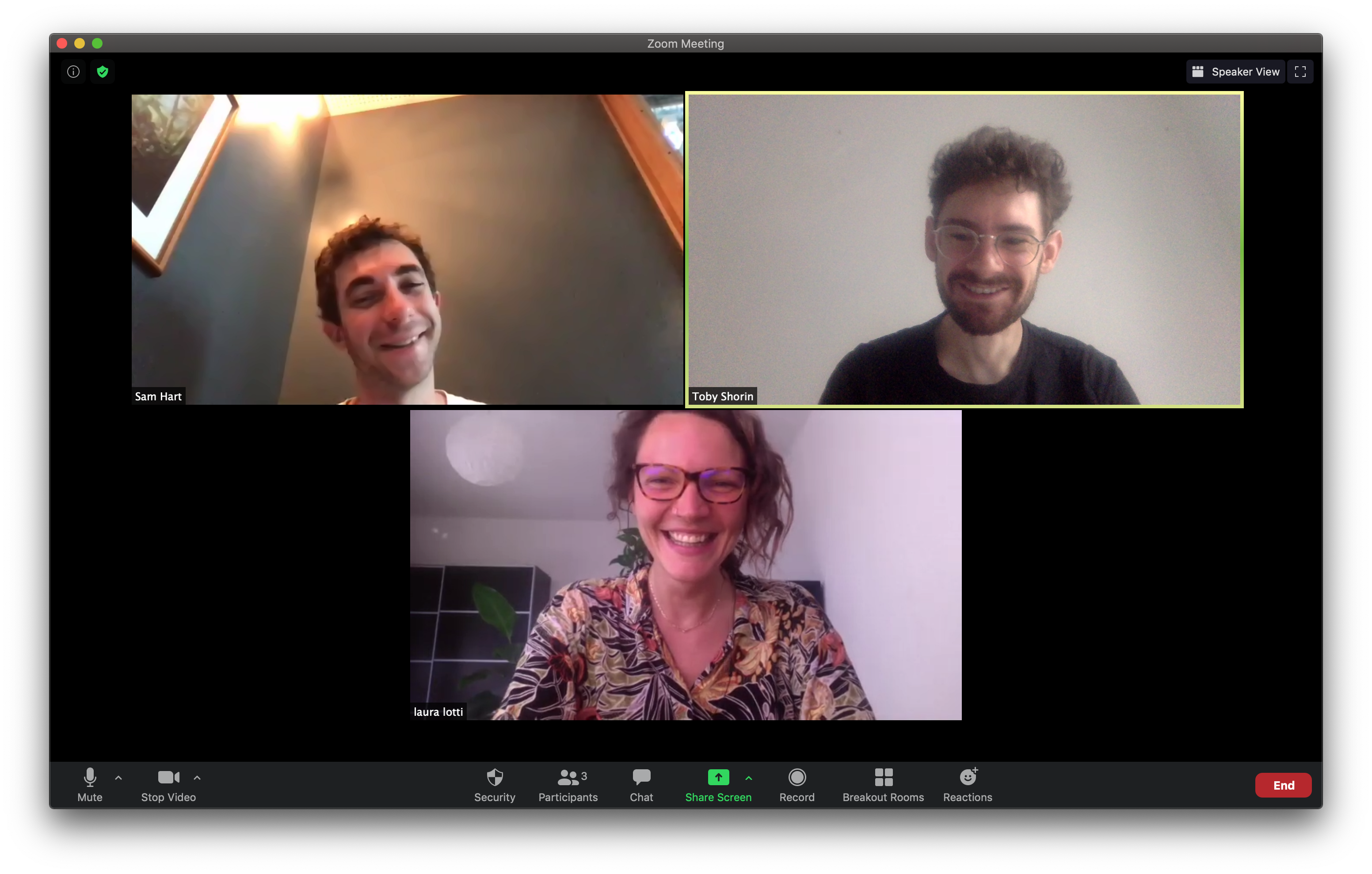
Squads = autonomy + community + equity
Squads are fucking invincible
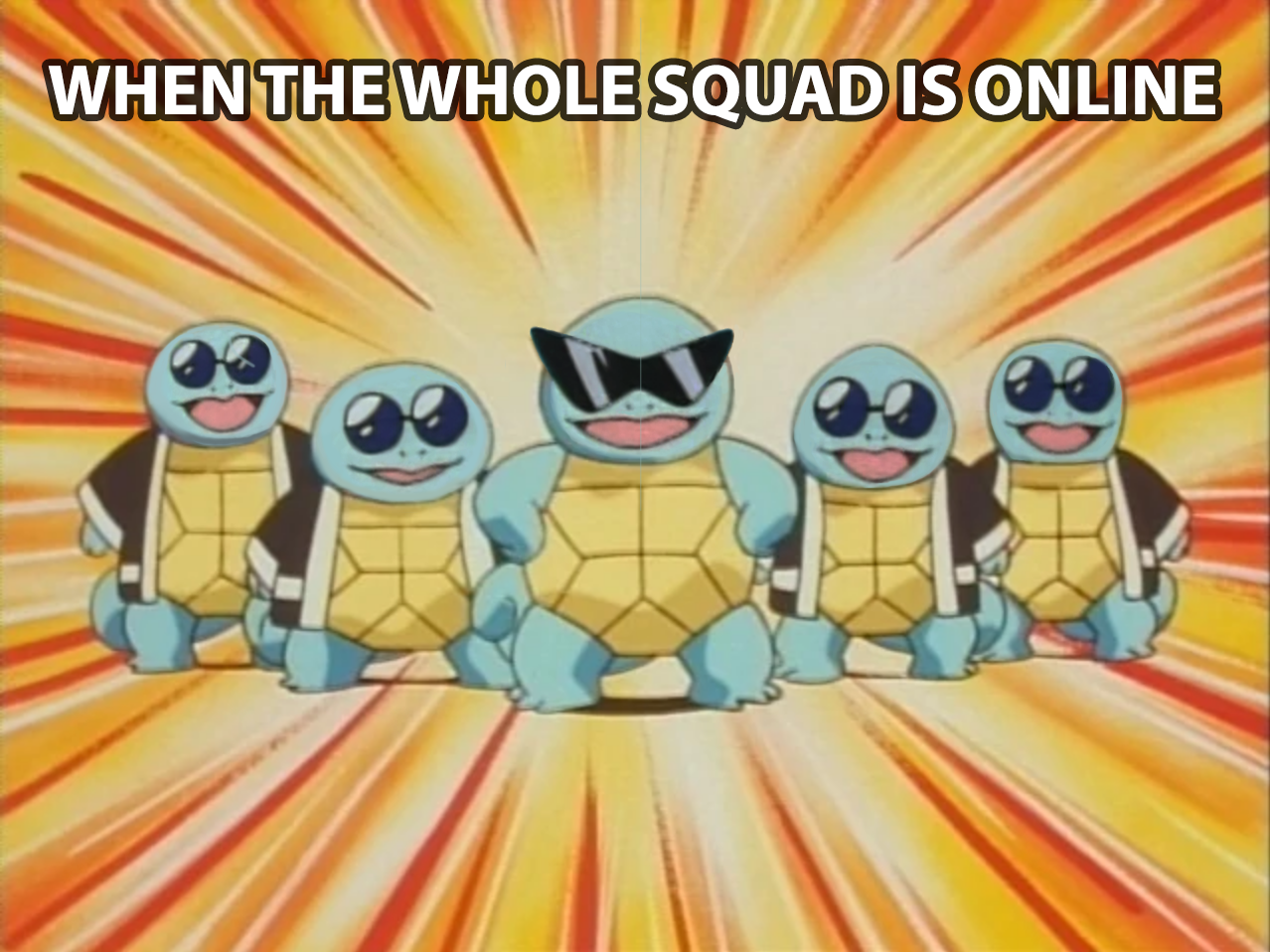
RADIANT SQUAD ENERGY
🔥🔥🔥🔥🔥🔥🔥🔥🔥🔥🔥🔥
LITERALLY THRIVING
